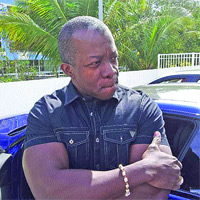WASHINGTON, (Reuters) – An FBI probe into alleged corruption in international soccer has recently intensified after investigators persuaded a key party to be a cooperating witness, U.S. law enforcement sources said.
They said that the witness is Daryan Warner, the son of former FIFA vice-president Jack Warner. The sources declined to further discuss the role of Daryan Warner, who could not be reached for comment.
They also would not say who might be charged, if anybody, or when. While the exact scope of the investigation is not clear, among the matters under scrutiny are two previously reported allegations involving Jack Warner, who is currently national security minister in his native Trinidad and Tobago.

The deepening of the probe indicates that a succession of corruption scandals involving FIFA and other international soccer bodies in the past few years may continue to cast a cloud over the sport for some time.
Jack Warner was formerly head of the Confederation of North, Central American and Caribbean Association Football (CONCACAF), as well as previously being one of a number of vice-presidents of FIFA, soccer’s global governing body. He has not been charged with any wrongdoing.
Since at least the summer of 2011, the FBI has been examining more than $500,000 in payments made by the Caribbean Football Union (CFU) over the past 20 years to an offshore company headed by top U.S. soccer official Chuck Blazer. That was a period during which Jack Warner was also head of the CFU, a position he held from the early 1980s until 2011.
The precise reasons for many of those payments is unclear. In 2011, Blazer said that the payments were meant to be repayments to him by Warner of “a significant amount of money” which Blazer said he loaned to Warner in 2004. Warner told the media in Trinidad that the payments were above board.
The Internal Revenue Service has joined in the investigation, which is looking into potential violations of U.S. tax laws and of U.S. anti-fraud statutes, including laws prohibiting wire fraud and mail fraud, law enforcement sources said.
“It’s shaping up like a major case,” one U.S. official familiar with the matter said.
In a telephone interview from Trinidad, Francis Joseph, a spokesman for Jack Warner, said that neither Jack nor Daryan Warner would have any comment on the investigation. “Nobody will speak to you about that,” Joseph told Reuters.
In 2011, Jack Warner told the Parliament of Trinidad: “I will hold my head high to the very end. I am not guilty of a single iota of wrongdoing.”
Daryan Warner was first interviewed by the FBI late last year after flying to the United States, a U.S. official said.
PRESUMPTION OF INNOCENCE
Jack Warner quit his FIFA and CONCACAF positions in June 2011 in the wake of allegations of bribery in a report by a lawyer commissioned by Blazer, a member of FIFA’s executive committee and former general secretary of CONCACAF.
The report alleged that Warner collaborated with another FIFA vice president at the time, Mohamed Bin Hammam of Qatar, to bribe Caribbean soccer officials so that they would back a bid by Bin Hammam to become FIFA’s president. Bin Hammam and Warner both have repeatedly denied wrongdoing.
Bin Hammam’s U.S. lawyer, Eugene Gulland, said that while he had heard that U.S. authorities were investigating CONCACAF issues, Bin Hammam had not been contacted about the probe.
When Warner resigned his FIFA position, the organization declared that “the presumption of innocence is maintained” in his case. Spokespeople for the FBI and IRS had no comment on the investigation.
Blazer, who has announced he will not seek re-election as the U.S. member of FIFA’s executive committee and will leave the position in May, said in a telephone interview that he had been advised by lawyers not to make any further comment. “I can’t say anything at all,” Blazer said.
Bin Hamman was banned for life from all FIFA and soccer activities in 2011 for trying to bribe soccer officials in the Caribbean in the run-up to the election. His ban was subsequently overturned by the Court of Arbitration for Sport (CAS) on the grounds that while it was “more likely than not” that he was the source of cash distributed by Warner “it is a situation of case not proven.”
The ban was then reinstated in December last year for a separate matter concerning “conflicts of interest” while he was president of the Asian Football Confederation.
At one point recently, investigators from the FBI and the IRS traveled to the Caribbean and interviewed a witness regarding the alleged cash payoffs for more than two and a half hours, said a person who was in recent contact with the witness.
Andrew Jennings, a British journalist and author of the book “Foul! The Secret World of FIFA: Bribes, Vote Rigging and Ticket Scandals,” said he has had several meetings with FBI investigators working on the case and provided the FBI and IRS with what Jennings describes as confidential documents he obtained related to payments from soccer organization funds to offshore bank accounts.
A law enforcement source confirmed that investigators had held discussions with Jennings.
In an email, FIFA’s media department said the Swiss-based organization was “unaware” of any FBI investigation related to the Americas and Caribbean.
The New York-based FBI squad which is conducting the soccer investigation is a squad that specializes in “Eurasian Organized Crime.” It is unclear why this particular squad is involved in the probe.




